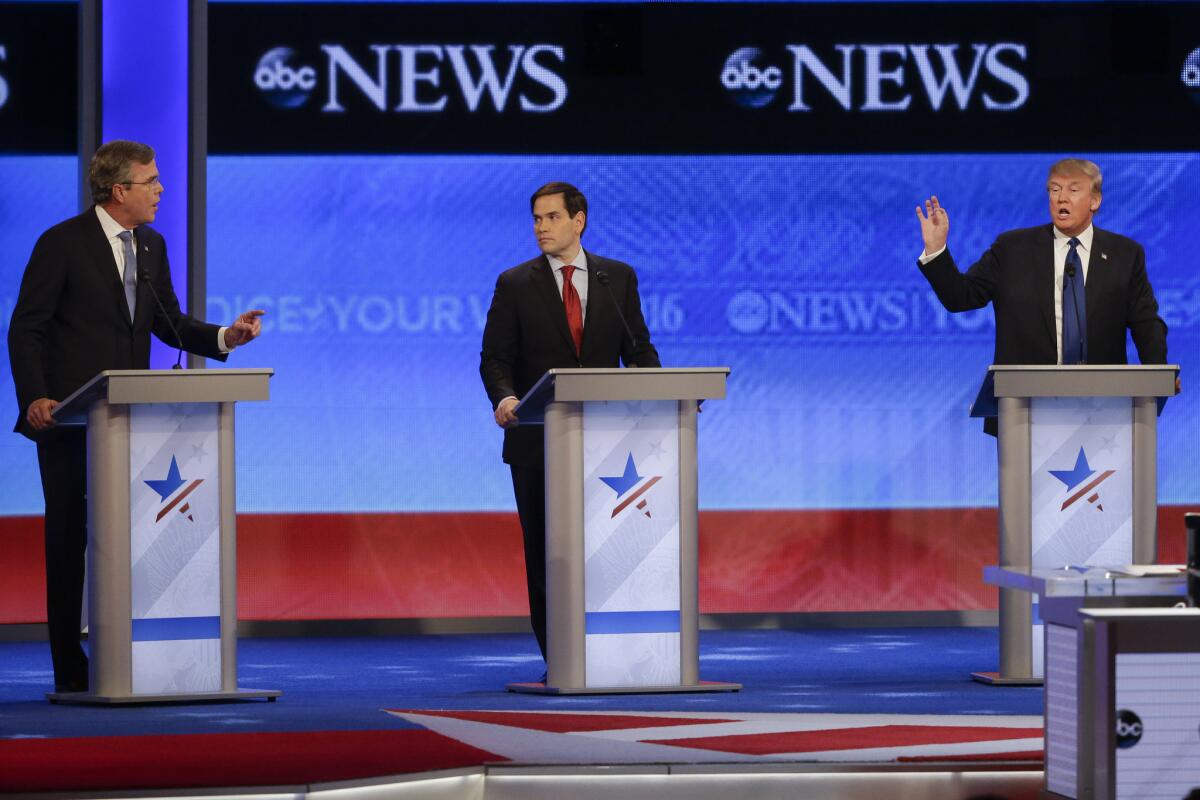Waterboarding, Rubio repeats and other takeaways from the Republican debate

Marco Rubio looks on as Jeb Bush, left, and Donald Trump, right, spar at the debate.
Saturday’s Republican presidential debate was one of the most contentious to date, not surprising given that several candidates are struggling to stay alive as the crowded field starts to winnow.
For several candidates, Tuesday’s New Hampshire primary is a last stand. For others, it will determine whether they remain top contenders. Here are a few notable moments and themes:
Less talk of God, more establishment
It was clear the campaign has moved from Iowa, where conservative Christians and arch-conservatives dominate the Republican caucuses. In New Hampshire, establishment voters hold more sway.
Here's why: New Hampshire is America’s least religious state, according to Gallup, with only 20% of residents identifying as “very religious.”
Social issues that consumed debates and stump speeches in Iowa were barely mentioned for much of this debate, with the abortion issue only appearing near the end in response to a question.
Instead, there were several minutes devoted to eminent domain, the kind of libertarian property rights issue that plays much bigger in the “Live Free or Die” state of New Hampshire.
Candidates fighting for the establishment vote, Ohio Gov. John Kasich and former Florida Gov. Jeb Bush, looked much more aggressive and comfortable. They drew some of the loudest applause for their calls to take some of the harder edges off the GOP’s message.
“In America, conservatism should mean not only that some rise with conservative principles, but everybody has a chance to rise regardless of who they are,” Kasich said.
At another point, Donald Trump embraced that definition as well. He said that, even as he opposed President Obama’s health plan, he would not take away care from the millions of people now getting insurance as a result of the law.
“We’re going to take care of people that are dying on the street,” he said.
Marco Rubio takes some hits
Almost everyone on stage was hoping to take down Rubio, whose late surge in Iowa and high standing in New Hampshire polls make him a strong threat to both the outsider candidates leading the pack and the establishment candidates making a last stand in New Hampshire.
New Jersey Gov. Chris Christie, who is struggling in the polls, got the fight he wanted. When Rubio began to brag about his success in passing a sanctions bill in the Senate, Christie pointed out that he'd missed the vote for it.
“That’s not leadership. That’s truancy,” Christie said, in a dig that not only called attention to Rubio’s high absence rate in the Senate, but also tagged the youthful-looking senator as a school boy.
When Rubio tried to respond, Christie cut him off, pointing to Rubio’s reputation for sticking to a script and repeating it.
“That’s what Washington, D.C., does,” Christie said. “The drive-by shot at the beginning, with incorrect and incomplete information, and then the memorized 25-second speech that is exactly what his advisors gave him.”
Rubio tries to reframe Obama’s faults to avoid comparison
The biggest knock against Rubio from fellow Republicans was the suggestion that he’s another President Obama – a young first-term senator who gives a good speech but lacks experience.
Rubio tried to recast the debate: It’s not about Obama’s incompetence, but his bad intentions.
If it’s only about experience, Americans might as well elect Vice President Joe Biden, Rubio said.
“Let's dispel once and for all with this fiction that Barack Obama doesn't know what he's doing,” Rubio said. “He knows exactly what he's doing. Barack Obama is undertaking a systematic effort to change this country, to make America more like the rest of the world.”
Republicans disagree on waterboarding, torture
For many, waterboarding became a divisive symbol of America’s war on terror in the George W. Bush administration.
Critics called it torture and said it didn't produce actionable intelligence. Supporters called it a legitimate interrogation tool, and insisted it helped.
The issue, even among Republicans, is not yet settled.
Trump not only endorsed waterboarding, but added, “I would bring back a hell of a lot worse than waterboarding.”
Texas Sen. Ted Cruz tried to stake out some middle ground. “I would not bring it back in any sort of widespread use,” he said, leaving open the definition of “widespread.”
Bush -- in the awkward spot of addressing one of his brother’s most controversial policies -- asserted that it was “used sparingly” in the past, but added that he would not resume using it.
But, like others on stage, he said closing the detention camp in Guantanamo Bay, Cuba, would be a “complete disaster.”
Kentucky Sen. Rand Paul, the GOP’s biggest opponent of the CIA's now-banned enhanced interrogation techniques, including waterboarding, withdrew from the race this week after a dismal showing in Iowa.
After the debate, Trump declined to clarify.
Trump: We will win
Donald Trump took a blow in Iowa when he fell to second place, but he looked like his old pugnacious self again, for better or worse.
He was booed by audience members, then attacked them as “donors and special interests.” He insisted that he could quickly solve even complex problems such as North Korea – just make the Chinese handle it, he said.
Bush finally took the fight to him, accusing Trump of trying to use eminent domain laws to seize an elderly woman’s home so he could build a parking lot for limousines. But Trump didn’t look deflated as he had in the days following Iowa.
“If I’m elected president, we will win, and we will win, and we will win,” he said at the close of the debate.
We will see.
Follow me @noahbierman on Twitter.
Get the L.A. Times Politics newsletter
Deeply reported insights into legislation, politics and policy from Sacramento, Washington and beyond. In your inbox three times per week.
You may occasionally receive promotional content from the Los Angeles Times.








